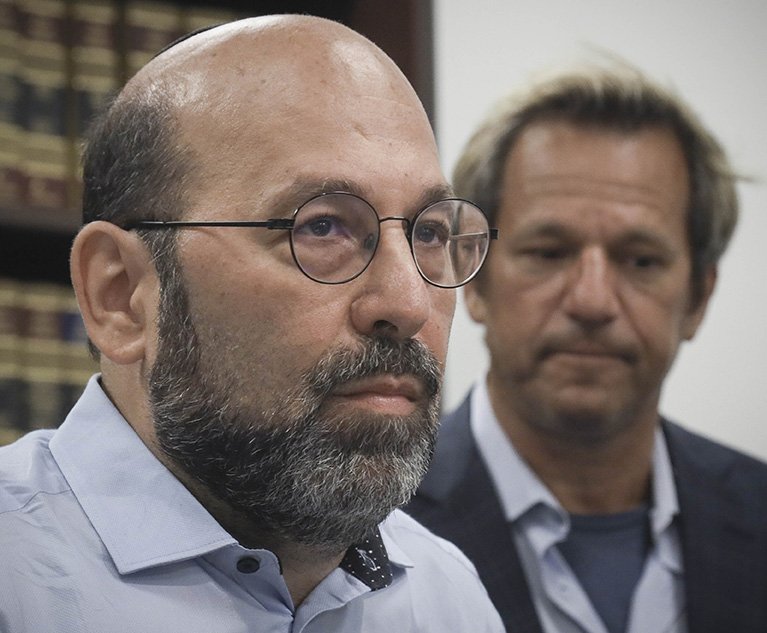
Appeals Court Rules 33 Men Suing Orthodox Jewish Day School Under Child Victims Act Can't Proceed Anonymously
The 33 unnamed plaintiffs "only submitted a short attorney affirmation, which merely repeated the relief requested in the order to show cause and made a single vague statement that plaintiffs might suffer further mental harm should their identities be revealed," the panel wrote. But the panel dismissed the motion without prejudice.
January 24, 2022 at 05:10 PM
5 minute read
A state appeals court has reversed the trial court and ruled that 33 former students of an Orthodox Jewish high school for boys, who have sued the school under New York’s Child Victims Act alleging they suffered years of rampant and sometimes sadistic sexual abuse, may not proceed in anonymity using John Doe labels rather than real names.
But the Appellate Division, First Department court has given the plaintiffs in the 2019-filed suit another chance to show why their motion to remain anonymous should be granted by the lower court. The First Department denied the motion “without prejudice to a new motion or motions supported by proper papers,” after it found the 33 anonymous plaintiffs had “failed to submit sufficient evidence to support the relief requested.”
The opinion from the five First Department justices heavily detailed recent case law addressing the question of the state legislature’s intent, when it passed The Child Victims Act of 2019, regarding whether plaintiffs suing their alleged past abusers may remain anonymous when doing so. Then the panel tersely-but-directly explained that in the pending lawsuit lodged by 38 men against The Marsha Stern Talmudical Academy—Yeshiva University High School for Boys in Manhattan, that the 33 men proceeding anonymously had simply not put forward sufficient evidence showing why they should be able to avoid disclosing their names.
“Several New York courts have addressed the legislature’s intent in enacting the CVA [Child Victims Act] with respect to the use of pseudonyms and concluded that the legislature ‘left it up to each alleged victim to determine whether to seek anonymity’ . . . [and] ‘left it to the courts to assess each individual case,’” the appellate panel wrote, citing Doe v Amherst Cent. Sch. Dist., 196 AD3d 9.
“In determining whether to grant a plaintiff’s request to proceed anonymously, the motion court must ‘use its discretion in balancing plaintiff’s privacy interest against the presumption in favor of open trials and against any potential prejudice to defendant,’” the panel further wrote, quoting Anonymous v Lerner, 124 AD3d 487. The panel added that ”a plaintiff seeking permission to proceed anonymously by employing a pseudonym must provide facts specific to the plaintiff that will allow the motion court to exercise its discretion in an informed manner.”
But in the case alleging negligent hiring and negligent retention of school employees who allegedly abused the plaintiffs in various ways during the 1970s and 1980s, the 33 unnamed plaintiffs “only submitted a short attorney affirmation, which merely repeated the relief requested in the order to show cause and made a single vague statement that plaintiffs might suffer further mental harm should their identities be revealed,” the panel wrote.
The “plaintiffs failed to provide any specific evidence as to why each unnamed plaintiff should be entitled to proceed anonymously,” the justices added.
The Child Victims Act, which became effective Aug. 14, 2019, extended the statute of limitations to prosecute sexual abuse against children, giving a one-year window for victims to pursue their claims. (The window was later extended for a second year because of the COVID-19 pandemic.) Under the Act, for example, victims up to age 55 who experienced abuse when they were younger than 18 could bring civil suits during the window of time. Previously the age had been up to age 23.
In the men’s 120-page complaint, they allege that a former school principal and a former faculty member abused then-boys at the school repeatedly in the 1970s and ’80s, and that the school was negligent in never reporting the abuse to the authorities and in failing to take proper action with regard to what occurred.
According to the complaint, a former assistant, associate and then head principal “specifically targeted vulnerable boys” for both sexual and physical abuse, “prey[ing] upon children of Holocaust survivors” and then “implor[ing] these children to not add to their parents’ suffering by telling them about his assaults.”
Moreover, the school official allegedly “used his power as a YUHS administrator to try and keep his victims from reporting his sexual assaults” by, for example, “threaten[ing] to accuse his victims of cheating, to lower their grades, or otherwise harm their scholastic futures.”
“Numerous students nevertheless found the courage to report [the former principal's] sexual abuse to YU and YUHS administrators, but their complaints always fell on deaf ears,” the complaint says.
The former faculty member allegedly was “vicious and sadistic in his abuse.” For example, in 1980 he allegedly “sprayed a young boy’s genital area with Chloraseptic and then violently shoved a toothbrush (with toothpaste)” into the boy. But after the boy and his father reported the act to the school’s vice president, the faculty member was allowed to remain on faculty and law enforcement was never notified about the alleged sodomy, the lawsuit alleges.
Kevin Mulhearn, an attorney in Orangeburg, New York, represents the 38 plaintiffs in the lawsuit. He couldn’t be reached for comment.
Karen Bitar, a Seyfarth Shaw partner in Manhattan, represented the defendants in the appeal, according to the First Department decision. The defendants include the Yeshiva University High School for Boys, members of the school’s board of trustees, and two school officials. Bitar also could not be reached.


